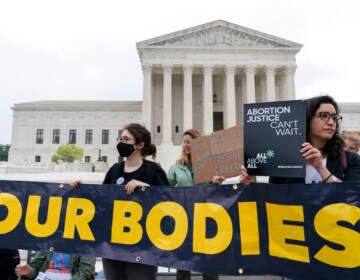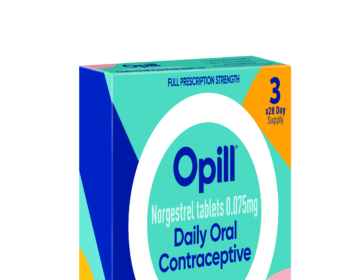Demand for online abortion services increases, as coverage expands to New Jersey
Online providers say much of the demand has come from patients in states where abortion is now restricted.

Abortion-rights activists setup an abortion pills educational booth as they protest outside the Supreme Court in Washington, Monday, July 4, 2022. The Supreme Court has ended constitutional protections for abortion that had been in place nearly 50 years, a decision by its conservative majority to overturn the court's landmark abortion cases. (AP Photo/Jose Luis Magana)
Online abortion services have seen a surge in demand since a U.S. Supreme Court ruling in June that overturned Roe v. Wade — the landmark case, decided in 1973, that guaranteed people the right to an abortion in the U.S.
Hey Jane is an online-only abortion care provider currently serving patients in seven states, including New Jersey.
The company ships abortion pills directly to clients.
People who don’t live in New Jersey can have medication mailed to a resident’s home or a P.O. box, though Hey Jane says it asks patients to remain in the Garden State for the duration of their treatment.
Hey Jane also provides 24/7 medical consultations and manages a peer-to-peer community forum among other services for medically eligible adults up to 10 weeks pregnant.
Gaby Santana, head of business at Hey Jane, said the company saw a 20% increase in patients and a more than 100% increase in website traffic in the month following the reversal of Roe.
“Anecdotally, what we know is this increase is coming from patients from restrictive states traveling to states where they’re able to receive treatment,” Santana said.
According to a Politico report, those numbers align with a national trend of increased demand for telemedicine abortion services after a draft opinion on the ruling leaked in May.
“Having a feeling that the [Roe v. Wade ruling] was going to happen, [we continued] to hire on the clinical side to make sure that we can support patients,” Santana said. “Regulatory, [we’ve had our] fair share of challenges, just being able to anticipate what’s coming.”
Meanwhile, brick-and-mortar reproductive health care facilities in New Jersey say they are grappling with a worker shortage while seeing increased demand for services from states where abortion is restricted or banned outright.
“We need nurses, phone room staff, medical assistants,” said Dr. Lisa Perriera, an abortion care physician and chief medical director for the Women’s Center in Cherry Hill and Philadelphia. “We’ve not had to reduce patient care, but when things get busier, it definitely [impacts] staff morale.”
Perriera said the Women’s Center does not currently provide online services. However, the organization hopes to expand to include telehealth options.
“People are showing us what we always knew would be true. If you make abortion illegal, it does not go away. The people that can get to us and have money to travel and have lives that allow for flexible travel are able to get the abortion care that they need,” Perriera said.
New Jersey abortion care providers and patients encounter security risks and threats of violence, she added. Perriera said that anti-abortion groups protest outside of her offices every day.
In July, Acting Attorney General Matt Platkin announced that the state would begin enforcing laws that prevent people from interfering with or threatening someone’s right to access an abortion.
“I’ve called on our county prosecutors to coordinate criminal charges. And to assist in law enforcement efforts in investigating threats to pregnant persons and reproductive health care providers,” Platkin said at the time. “Our county prosecutors and law enforcement officers will work together to hold responsible those who would seek to intimidate, harass, terrorize, or harm patients and providers.”
Platkin also announced that the state Office of Homeland Security and Preparedness will direct $5 million of state funding to New Jersey’s Reproductive Health Security Grant program, which “high-risk” health care facilities, like the Women’s Center, can use to beef up security measures.
WHYY is your source for fact-based, in-depth journalism and information. As a nonprofit organization, we rely on financial support from readers like you. Please give today.








